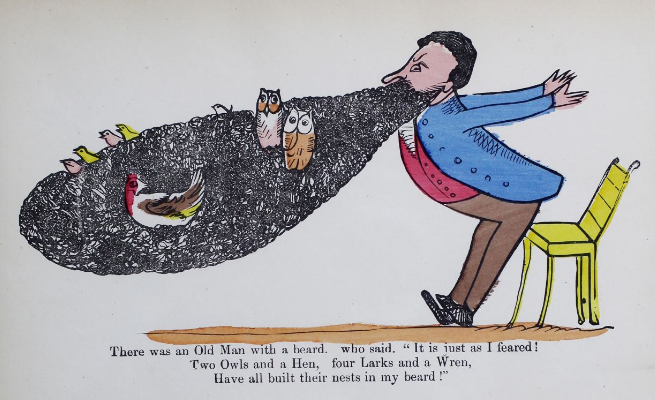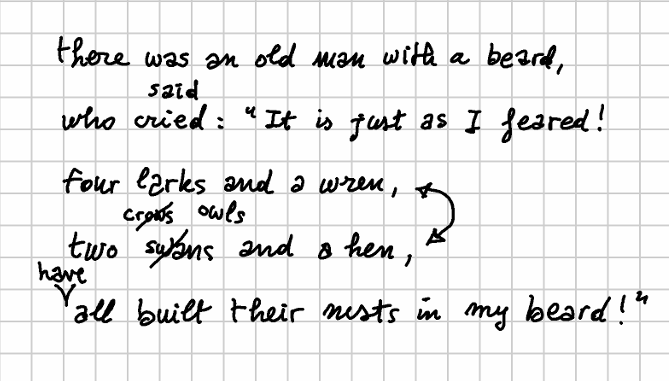Example - Limerick
Let us now consider a more realistic example, by exporting the limerick discussed about modeling.

The mock autograph created for this text is:

with its base text:
there was an old man with a beard,
who cried: "It is just as I feared!
four larks and a wren,
two swans and a hen,
all built their nests in my beard!"
Our snapshot operations have been reconstructed as:
- (v1) replace “cried” with “said”;
- (v2) replace “swans” with “crows”;
- (v3) insert “have” before “all” (for metrical reasons): version
alpha; - (v4) swap verses 3-4;
- (v5) replace “crows” with “owls”: version
beta.
So, there are 2 staged versions: an intermediate one (v3=alpha) and a final one (v5=beta).
Stage 1
First we use a tree builder to create a “multi” tree from our snapshot. This tree has two branches for the two staged versions v3 and v5. So, its root is just a blank node, branching into two blank nodes for these two versions:
+ ⯈ [1.1]
+ ⯈ [2.1] → (sub-id=v3, version=alpha)
...
+ ⯈ [2.2] → (sub-id=v5, version=beta)
...
Stage 2
Then we apply the linear merge filter to each branch of the tree. The resulting dump is:
+ ⯈ [1.1]
+ ⯈ [2.1] → (sub-id=v3, version=alpha)
+ ⯈ [3.1] there was an old man with a beard, → #1: there was an old man with a beard,
+ ⯈ [4.1] ↵who → #35: ↵who
+ ⯈ [5.1] cried → #40: cried ($del="2fc9efa184 v0:v1 1", $del="2fc9efa184 v0:v1 2", $del="2fc9efa184 v0:v1 3", $del="2fc9efa184 v0:v1 4", $del="2fc9efa184 v0:v1 5")
+ ⯈ [6.1] said: "It is just as I feared! → #151: said: "It is just as I feared!
+ ⯈ [7.1] ↵four larks and a wren, → #71: ↵four larks and a wren, ($seg-in="5625cc16c5 v3:v4 1", $seg-in="5625cc16c5 v3:v4 2", $seg-in="5625cc16c5 v3:v4 3", $seg-in="5625cc16c5 v3:v4 4", $seg-in="5625cc16c5 v3:v4 5", $seg-in="5625cc16c5 v3:v4 6", $seg-in="5625cc16c5 v3:v4 7", $seg-in="5625cc16c5 v3:v4 8", $seg-in="5625cc16c5 v3:v4 9", $seg-in="5625cc16c5 v3:v4 10", $seg-in="5625cc16c5 v3:v4 11", $seg-in="5625cc16c5 v3:v4 12", $seg-in="5625cc16c5 v3:v4 13", $seg-in="5625cc16c5 v3:v4 14", $seg-in="5625cc16c5 v3:v4 15", $seg-in="5625cc16c5 v3:v4 16", $seg-in="5625cc16c5 v3:v4 17", $seg-in="5625cc16c5 v3:v4 18", $seg-in="5625cc16c5 v3:v4 19", $seg-in="5625cc16c5 v3:v4 20", $seg-in="5625cc16c5 v3:v4 21", $seg-in="5625cc16c5 v3:v4 22")
+ ⯈ [8.1] ↵two → #94: ↵two ($seg-in="5625cc16c5 v3:v4 23", $seg2-in="5625cc16c5 v3:v4 1", $seg2-in="5625cc16c5 v3:v4 2", $seg2-in="5625cc16c5 v3:v4 3", $seg2-in="5625cc16c5 v3:v4 4")
+ ⯈ [9.1] swans → #99: swans ($del="071f47de7f v1:v2 1", $del="071f47de7f v1:v2 2", $del="071f47de7f v1:v2 3", $del="071f47de7f v1:v2 4", $del="071f47de7f v1:v2 5")
+ ⯈ [10.1] crows and a hen, → #155: crows and a hen, ($seg2-in="5625cc16c5 v3:v4 5", $seg2-in="5625cc16c5 v3:v4 6", $seg2-in="5625cc16c5 v3:v4 7", $seg2-in="5625cc16c5 v3:v4 8", $seg2-in="5625cc16c5 v3:v4 9", $seg2-in="5625cc16c5 v3:v4 10", $seg2-in="5625cc16c5 v3:v4 11", $seg2-in="5625cc16c5 v3:v4 12", $seg2-in="5625cc16c5 v3:v4 13", $seg2-in="5625cc16c5 v3:v4 14", $seg2-in="5625cc16c5 v3:v4 15", $seg2-in="5625cc16c5 v3:v4 16", $seg2-in="5625cc16c5 v3:v4 17", $seg2-in="5625cc16c5 v3:v4 18", $seg2-in="5625cc16c5 v3:v4 19", $seg2-in="5625cc16c5 v3:v4 20")
+ ⯈ [11.1] ↵ → #115: ↵ ($seg2-in="5625cc16c5 v3:v4 21")
+ ⯈ [12.1] have → #160: have ($seg-out="c503ad6811 v2:v3 1", $seg-out="c503ad6811 v2:v3 2", $seg-out="c503ad6811 v2:v3 3", $seg-out="c503ad6811 v2:v3 4", $seg-out="c503ad6811 v2:v3 5")
- ■ [13.1] all built their nests in my beard!" → #116: all built their nests in my beard!"
+ ⯈ [2.2] → (sub-id=v5, version=beta)
+ ⯈ [3.1] there was an old man with a beard, → #1: there was an old man with a beard,
+ ⯈ [4.1] ↵who → #35: ↵who
+ ⯈ [5.1] cried → #40: cried ($del="2fc9efa184 v0:v1 1", $del="2fc9efa184 v0:v1 2", $del="2fc9efa184 v0:v1 3", $del="2fc9efa184 v0:v1 4", $del="2fc9efa184 v0:v1 5")
+ ⯈ [6.1] said: "It is just as I feared! → #151: said: "It is just as I feared!
+ ⯈ [7.1] ↵ → #71: ↵
+ ⯈ [8.1] four larks and a wren, → #72: four larks and a wren, ($del="5625cc16c5 v3:v4 1", $del="5625cc16c5 v3:v4 2", $del="5625cc16c5 v3:v4 3", $del="5625cc16c5 v3:v4 4", $del="5625cc16c5 v3:v4 5", $del="5625cc16c5 v3:v4 6", $del="5625cc16c5 v3:v4 7", $del="5625cc16c5 v3:v4 8", $del="5625cc16c5 v3:v4 9", $del="5625cc16c5 v3:v4 10", $del="5625cc16c5 v3:v4 11", $del="5625cc16c5 v3:v4 12", $del="5625cc16c5 v3:v4 13", $del="5625cc16c5 v3:v4 14", $del="5625cc16c5 v3:v4 15", $del="5625cc16c5 v3:v4 16", $del="5625cc16c5 v3:v4 17", $del="5625cc16c5 v3:v4 18", $del="5625cc16c5 v3:v4 19", $del="5625cc16c5 v3:v4 20", $del="5625cc16c5 v3:v4 21", $del="5625cc16c5 v3:v4 22")
+ ⯈ [9.1] ↵ → #94: ↵ ($del="5625cc16c5 v3:v4 23")
+ ⯈ [10.1] two → #95: two ($seg2-in="5625cc16c5 v3:v4 1", $seg2-in="5625cc16c5 v3:v4 2", $seg2-in="5625cc16c5 v3:v4 3", $seg2-in="5625cc16c5 v3:v4 4")
+ ⯈ [11.1] swans → #99: swans ($del="071f47de7f v1:v2 1", $del="071f47de7f v1:v2 2", $del="071f47de7f v1:v2 3", $del="071f47de7f v1:v2 4", $del="071f47de7f v1:v2 5")
+ ⯈ [12.1] crows → #155: crows ($del="e5747b06d6 v4:v5 1", $del="e5747b06d6 v4:v5 2", $del="e5747b06d6 v4:v5 3", $del="e5747b06d6 v4:v5 4", $del="e5747b06d6 v4:v5 5")
+ ⯈ [13.1] owls → #165: owls ($seg-out="e5747b06d6 v4:v5 1", $seg-out="e5747b06d6 v4:v5 2", $seg-out="e5747b06d6 v4:v5 3", $seg-out="e5747b06d6 v4:v5 4")
+ ⯈ [14.1] and a hen, → #104: and a hen, ($seg2-in="5625cc16c5 v3:v4 10", $seg2-in="5625cc16c5 v3:v4 11", $seg2-in="5625cc16c5 v3:v4 12", $seg2-in="5625cc16c5 v3:v4 13", $seg2-in="5625cc16c5 v3:v4 14", $seg2-in="5625cc16c5 v3:v4 15", $seg2-in="5625cc16c5 v3:v4 16", $seg2-in="5625cc16c5 v3:v4 17", $seg2-in="5625cc16c5 v3:v4 18", $seg2-in="5625cc16c5 v3:v4 19", $seg2-in="5625cc16c5 v3:v4 20")
+ ⯈ [15.1] ↵ → #115: ↵ ($seg2-in="5625cc16c5 v3:v4 21")
+ ⯈ [16.1] two crows and a hen, → #95: two crows and a hen, ($del="5625cc16c5 v3:v4 1", $del="5625cc16c5 v3:v4 2", $del="5625cc16c5 v3:v4 3", $del="5625cc16c5 v3:v4 4", $del="5625cc16c5 v3:v4 5", $del="5625cc16c5 v3:v4 6", $del="5625cc16c5 v3:v4 7", $del="5625cc16c5 v3:v4 8", $del="5625cc16c5 v3:v4 9", $del="5625cc16c5 v3:v4 10", $del="5625cc16c5 v3:v4 11", $del="5625cc16c5 v3:v4 12", $del="5625cc16c5 v3:v4 13", $del="5625cc16c5 v3:v4 14", $del="5625cc16c5 v3:v4 15", $del="5625cc16c5 v3:v4 16", $del="5625cc16c5 v3:v4 17", $del="5625cc16c5 v3:v4 18", $del="5625cc16c5 v3:v4 19", $del="5625cc16c5 v3:v4 20")
+ ⯈ [17.1] ↵ → #115: ↵ ($del="5625cc16c5 v3:v4 21")
+ ⯈ [18.1] four larks and a wren, → #72: four larks and a wren, ($seg-in="5625cc16c5 v3:v4 1", $seg-in="5625cc16c5 v3:v4 2", $seg-in="5625cc16c5 v3:v4 3", $seg-in="5625cc16c5 v3:v4 4", $seg-in="5625cc16c5 v3:v4 5", $seg-in="5625cc16c5 v3:v4 6", $seg-in="5625cc16c5 v3:v4 7", $seg-in="5625cc16c5 v3:v4 8", $seg-in="5625cc16c5 v3:v4 9", $seg-in="5625cc16c5 v3:v4 10", $seg-in="5625cc16c5 v3:v4 11", $seg-in="5625cc16c5 v3:v4 12", $seg-in="5625cc16c5 v3:v4 13", $seg-in="5625cc16c5 v3:v4 14", $seg-in="5625cc16c5 v3:v4 15", $seg-in="5625cc16c5 v3:v4 16", $seg-in="5625cc16c5 v3:v4 17", $seg-in="5625cc16c5 v3:v4 18", $seg-in="5625cc16c5 v3:v4 19", $seg-in="5625cc16c5 v3:v4 20", $seg-in="5625cc16c5 v3:v4 21", $seg-in="5625cc16c5 v3:v4 22")
+ ⯈ [19.1] ↵ → #94: ↵ ($seg-in="5625cc16c5 v3:v4 23")
+ ⯈ [20.1] have → #160: have ($seg-out="c503ad6811 v2:v3 1", $seg-out="c503ad6811 v2:v3 2", $seg-out="c503ad6811 v2:v3 3", $seg-out="c503ad6811 v2:v3 4", $seg-out="c503ad6811 v2:v3 5")
- ■ [21.1] all built their nests in my beard!" → #116: all built their nests in my beard!"
Summarizing the above data (and using _ for an initial/final whitespace and ↵ for LF):
- v3:
there was an old man with a beard,↵who_criedsaid: "It is just as I feared!↵four larks and a wren,↵two_swanscrows and a hen,↵have_all built their nests in my beard!"
- v5:
there was an old man with a beard,↵who_criedsaid: "It is just as I feared!↵four larks and a wren,↵two_swanscrowsowls_and a hen,↵two crows and a hen,↵four larks and a wren,↵have_all built their nests in my beard!"
As you can see, here some segments just contain a LF character. As we’re going to output XML, such segments are just noise, because we are not going to represent them as newline characters; we will rather end a verse whenever there is one. So, we’re going to use another filter to remove these nodes while preserving the newline information.
Stage 3
To this end, we apply another linear text tree filter, the block linear text tree filter. This splits nodes whenever they include a LF character, and removes nodes with one or more LF characters, while adding to the preceding node a feature named eol-tail, which marks any segment placed at the end of a line.
The resulting nodes are now:
- v3:
there was an old man with a beard,witheol-tailwho_criedwith$del(v0:v1)said: with$seg-out(v0:v1): "It is just as I feared!witheol-tailfour larks and a wren,with$seg-in(v3:v4) andeol-tailtwo_with$seg2-in(v3:v4)swanswith$del(v1:v2)crowswith$seg-out(v1:v2),$seg2-in(v3:v4)_and a hen,with$seg2-in(v3:v4) andeol-tailhave_with$seg-out(v2:v3)all built their nests in my beard!"with$anchor(v2:v3)
there was an old man with a beard
who {cried}1[said]1: "It is just as I feared!`
(four larks and a wren,)4
(two )4{swans}2([crows]2)4 and a hen,
[have]3 all built their nests in my beard!"
- 4: the input of the operation past v3.
- 3: insert
have_beforeall - 2: replace
swanswithcrows -
1: replace
criedwithsaid - v5:
there was an old man with a beard,witheol-tailwho_criedwith$del(v0:v1)said: with$seg-out(v0:v1): "It is just as I feared!witheol-tailfour larks and a wren,with$del(v3:v4) andeol-tailtwo_with$seg2-in(v3:v4)swanswith$del(v1:v2)crowswith$del(v4:v5)owlswith$seg-out(v4:v5)_and a hen,with$seg2-inand$seg-out(v3:v4), andeol-tailtwo crows and a hen,with$del(v3:v4) andeol-tailfour larks and a wren,with$seg-inand$seg2-out(v3:v4), andeol-tailhave_with$seg-out(v2:v3)all built their nests in my beard!"with$anchor(v2:v3)
there was an old man with a beard,
who {cried}1[said]1: "It is just as I feared!
{four larks and a wren,}4
(two )4{swans}2{crows}5[owls]5
([ and a hen, ])4
{two crows and a hen,}4
([four larks and a wren,])4
[have ]3all built their nests in my beard!"
- 5: replace
crowswithowls - 4: swap verses
four larks and a wren,/two crows and a hen - 3: insert
have_beforeall - 2: replace
swanswithcrows - 1: replace
criedwithsaid
TODO